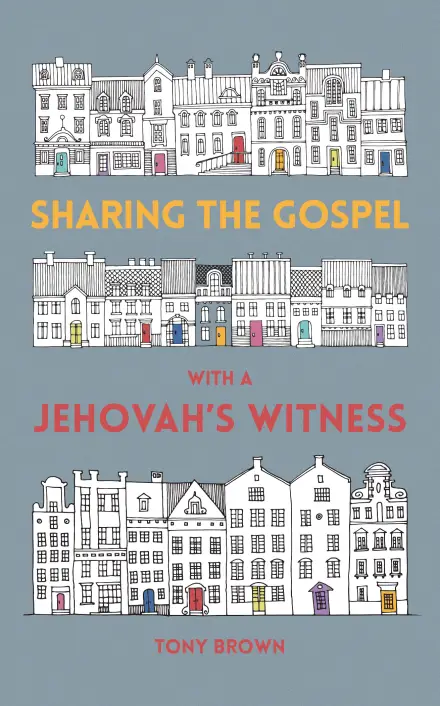Pastor of Ferniehill Evangelical Church; blogger
This book is incredibly helpful and full of practical tips on how to share the gospel with a Catholic friend. If you know a Catholic (there are 1.4 billion in the world, so I imagine you do), I recommend you get this book!
Alistair Chalmers
An engaging guide to sharing Jesus with Catholics
This is a great book to further your knowledge and insight of the catholic teachings, so that you will be better able to share the gospel with a catholic friend. It is really well laid out and doesn't necessarily give you arguments to debate with but gives you aids to know what they believe.
You will be introduced to Danny, Daneille, Connor, Ingrid and Bobby.
Steven
An engaging guide to sharing Jesus with Catholics
This is a great book to further your knowledge and insight of the catholic teachings, so that you will be better able to share the gospel with a catholic friend. It is really well laid out and doesn't necessarily give you arguments to debate with but gives you aids to know what they believe.
You will be introduced to Danny, Daneille, Connor, Ingrid and Bobby.
Steven
An excellent book to encourage gospel conversations
If you want to share the gospel with a Roman Catholic friend, this book is an excellent starting point for guidance and encouragement. Richard Baxter (who grew up as a Catholic) introduces us to some hypothetical Catholics, showing the diversity of beliefs, practices and experiences that might lie behind someone's statement "I'm a Catholic". The rest of the book then helps us to think about how to speak about Jesus with the specific individuals we might encounter, giving pointers on asking good questions, countering caricatures and sharing our own experiences. Most of the chapters focus on a specific area of doctrine (like justification, the pope, purgatory). The main aim, though, is not to provide us with doctrinal debating points but to give us confidence in lovingly pointing people to Jesus. As he summarises at the end, this book isn't focussed on "understanding Roman Catholic doctrine so much as understanding your Catholic friends." That's exactly what this book helps us to do, and I'm sure it will encourage many many good conversations about Jesus.
Adam
Well written and helpful
This is an excellent book which in my view shows both great insight into Catholicism generally and pastoral sensitivity in how to deal with Catholics we meet.
richard
Really helpful little book
I have read other books in this series from 10ofthose, and was surprised, and interested, to know how this book would approach this topic.
I have grown up in a heavily Catholic town, and when we go out to do evangelism are frequently meeting those who describe themselves as Catholic. But, as Richard Baxter explains, not all Catholics are Catholics with a capital C.
As with other church denominations there will be those with a nominal belief (Indifferent Ingrid), those who attend but have no clear faith (Confused Connor), those who hold to all the traditional doctrines (Doctrinal Danny/Danielle) and even those who are born again believers (Born Again Bobby).
I think this is what Richard does really well. He starts the book with his own testimony of how he was saved, and his background in the Catholic church, and explains that when we speak to Catholics we must seek to know where they stand personally. We can't approach everyone with our own 95 thesis on what we believe is wrong with their doctrine or traditions.
We need to ask them what it is they actually believe, point them to Jesus, and (when relevant!) help them to see what the Bible teaches compared to what they may believe.
This short book is a really helpful starting point for those who have Catholic friends/family, or those seeking to share the gospel in places where you will come into contact with Catholics.
Each chapter has helpful hints and tips, and there are a few chapters touching very briefly on key doctrines which evangelicals would highlight as contrary to the Bibles teaching.
I read it in 1 hour, so it's a nice short book to get you started, and there are a number of resource recommendations for anyone wanting to delve deeper.
Bethan
Wise and helpful
Not a rediscovered work by the great 17th century Puritan, but a newly written one by a contemporary author from a Catholic background as part of the excellent Sharing the Gospel series. Richard Baxter gives his testimony and then shows that not all Catholics are the same. As with all evangelism we must listen to the person to see where they are at and jumping into intellectual arguments against Catholicism will often not be the right approach. He introduces us to different Catholic personas to illustrate this. There is Doctrinal Danny who loves the historical tradition of the Council of Trent etc. On the other hand, Doctrinal Danielle loves the more liberal Second Vatican Council. Then there is Confused Connor, who believes in God, but is ignorant of the Bible and Catholic teaching, as well as Indifferent Ingrid, a cultural Catholic. Finally, there is Born-again Bobby, a genuine Christian whose growth is stunted by Catholic teaching. Baxter advises that one’s approach should be determined by whom we are talking to. These personas then inform the discussion that follow on the issues in question: authority (Scripture and tradition), justification, the Papacy, Mary, communion and purgatory. The best approach is to encourage our Catholic friends to see what the Bible says and point them to Jesus. So, if you have Catholic friends or acquaintances and want guidance on how to share Jesus with them, this book is an excellent start.
Stephen
Such a helpful book!
This book from Richard is so encouraging.
It is written lovingly, and it’s really helpful in understanding that there is not ‘one type of Catholic’; that different Catholics believe different things.
This book exalts Jesus and His Gospel - and will hopefully help you give some tips for how to have relevant conversations about this with your Catholic friends.
The same review, in Latin:
Hic liber a Ricardo scriptus est valde hortativus.
Amante scriptus est, et perutilis est ad intelligendum non esse "unum genus Catholici"; Catholicos diversos diversas res credere.
Hic liber Iesum eiusque Evangelium extollit - et speramus te adiuvaturum esse ut aliquas admonitiones de quomodo sermones pertinentes de hac re cum amicis tuis Catholicis habeas.
JONATHAN
Compassionate and Winsome
I went into this book a little skeptical. I'm often disheartened by how protestants dismiss Catholics as "not being Christians" without any nuance in the matter. Richard Baxter, however, is quite clear from the outset that he believes there are those in the Catholic Church that are saved through grace by faith, though acknowledges that the Catholic Church is likely not the best place to grow in that true faith. His exploration of Catholic doctrines through the lens of different kinds of Catholics you might encounter is a really helpful framework for sharing the gospel with Catholics...and truly with anyone you might meet!
Brianna Taylor, Marketing Manager at 10ofthose















